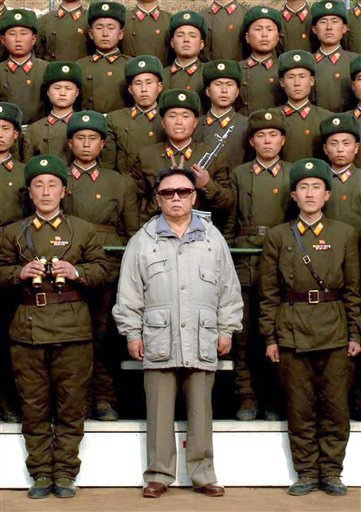| << Chapter < Page | Chapter >> Page > |
Power in a dictatorship is held by a single person (or a very small group) that wields complete and absolute authority over a government and population. Like some absolute monarchies, dictatorships may be corrupt and seek to limit or even eradicate the liberties of the general population. Dictators use a variety of means to perpetuate their authority. Economic and military might, as well as intimidation and brutality are often foremost among their tactics; individuals are less likely to rebel when they are starving and fearful. Many dictators start out as military leaders and are conditioned to the use of violence against opposition.
Some dictators also possess the personal appeal that Max Weber identified with a charismatic leader. Subjects of such a dictator may believe that the leader has special ability or authority and may be willing to submit to his or her authority. The late Kim Jong-Il, North Korean dictator, and his successor, Kim Jong-Un, exemplify this type of charismatic dictatorship.
Some dictatorships do not align themselves with any particular belief system or ideology; the goal of this type of regime is usually limited to preserving the authority of the dictator. A totalitarian dictatorship is even more oppressive and attempts to control all aspects of its subjects’ lives; including occupation, religious beliefs, and number of children permitted in each family. Citizens may be forced to publicly demonstrate their faith in the regime by participating in marches and demonstrations.
Some “benevolent” dictators, such as Napoleon and Anwar Sadat, are credited with advancing their people’s standard of living or exercising a moderate amount of evenhandedness. Others grossly abuse their power. Joseph Stalin, Adolf Hitler, Saddam Hussein, Cambodia’s Pol Pot, and Zimbabwe’s Robert Mugabe, for instance, are heads of state who earned a reputation for leading through fear and intimidation.

A democracy is a form of government that strives to provide all citizens with an equal voice, or vote, in determining state policy, regardless of their level of socioeconomic status. Another important fundamental of the democratic state is the establishment and governance of a just and comprehensive constitution that delineates the roles and responsibilities of leaders and citizens alike.
Democracies, in general, ensure certain basic rights for their citizens. First and foremost, citizens are free to organize political parties and hold elections. Leaders, once elected, must abide by the terms of the given nation’s constitution and are limited in the powers they can exercise, as well as in the length of the duration of their terms. Most democratic societies also champion freedom of individual speech, the press, and assembly, and they prohibit unlawful imprisonment. Of course, even in a democratic society, the government constrains citizens' total freedom to act however they wish. A democratically elected government does this by passing laws and writing regulations that, at least ideally, reflect the will of the majority of its people.
Although the United States champions the democratic ideology, it is not a “pure” democracy. In a purely democratic society, all citizens would vote on all proposed legislation, and this is not how laws are passed in the United States. There is a practical reason for this: a pure democracy would be hard to implement. Thus, the United States is a constitution-based federal republic in which citizens elect representatives to make policy decisions on their behalf. The term representative democracy , which is virtually synonymous with republic , can also be used to describe a government in which citizens elect representatives to promote policies that favor their interests. In the United States, representatives are elected at local and state levels, and the votes of the Electoral College determine who will hold the office of president. Each of the three branches of the U.S. government—the executive, judicial, and legislative—is held in check by the other branches.
Nations are governed by different political systems, including monarchies, oligarchies, dictatorships, and democracies. Generally speaking, citizens of nations wherein power is concentrated in one leader or a small group are more likely to suffer violations of civil liberties and experience economic inequality. Many nations that are today organized around democratic ideals started out as monarchies or dictatorships but have evolved into more egalitarian systems. Democratic ideals, although hard to implement and achieve, promote basic human rights and justice for all citizens.
Do you feel the United States has become an oligarchy? Why, or why not?
Explain how an absolute monarchy differs from a dictatorship.
In which form of government do average citizens have the least political power? What options might they have for exerting political power under this type of regime?
The Tea Party is among the highest-profile grassroots organizations active in U.S. politics today. What is its official platform? Examine the Tea Party website to find out more information at (External Link) .
Balz, Dan. 2014. "For GOP, demographic opportunities, challenges await". The Washington Post . Retrieved December 11, 2014. ( (External Link) )
Dunbar, John (2012). “The Citizen’s United Decision and Why It Matters” The Center for Public Integrity. October 18, 2012. Retrieved October 2, 2014 ( (External Link) )
Krugman, Paul. 2011. “Oligarchy, American Style.” New York Times , November 3. Retrieved February 14, 2012 ( (External Link) ).
PBS Online. “Gilded Age.” 1999. The American Experience . Retrieved February 14, 2012 ( (External Link) ).
Schulz, Thomas. 2011. “The Second Gilded Age: Has America Become an Oligarchy?” Spiegel Online International , October 28. Retrieved February 14, 2012 ( (External Link) ).
Winters, Jeffrey. 2011. “Oligarchy and Democracy.” American Interest , November/December. Retrieved February 17, 2012 ( (External Link) ).

Notification Switch
Would you like to follow the 'Introduction to sociology 2e' conversation and receive update notifications?